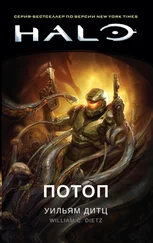Mac was aghast. “What happened to him?”
“He came for me,” Huntington said. “And the dogs tore him up. I called them off, but it was too late by then. He bled out.”
“But why store the body in here ?” Mac inquired.
“Where else would I put it?” Huntington countered. “I couldn’t go to the police, not without alerting Howard to my involvement, and the ground is frozen. I’ll bury him in the spring.”
They left the smokehouse. Huntington’s story made sense. Not that Mac cared. Huntington could use Casey for dog food as far as she was concerned. “Did Casey know about Operation Payback?”
“No,” Huntington said. “He didn’t.”
“Good. What is the plan? And could it work?”
It took Huntington three or four minutes to explain. Once she was finished, Mac couldn’t help but smile. “I like it. Are you still willing to sign on?”
Their eyes met. “Howard is like a cancer that needs to be cut out,” Huntington answered. “Plus, if we free those prisoners, then so much the better. And there’s one more thing.”
“Which is?”
“That bastard is camped in my granddaddy’s lodge. That pisses me off.”
SPRING HILL, TENNESSEE
President Sloan was in Fort Knox, Kentucky, working on a speech. That’s what the press had been told. It wasn’t true, however. After weeks of grinding warfare, the Union Army had been able to advance a few miles. Reporters were calling it “the Battle of Spring Hill.” That was the sort of victory that Sloan had been hungering for. And rather than simply read the reports and watch battle footage, he had decided to visit the battlefield.
No one liked the idea, especially the Secret Service, which was understandably worried about putting the president down so close to the front lines. But Sloan was insistent. So under the cover of darkness, he’d been flown to Murfreesboro, given a uniform to wear, and helicoptered out to the battlefield. General Hern had been notified, but no one else knew. And rather than lay on extra security, which might alert the rebs, Secret Service Director Jenkins was keeping everything low-key.
That’s why no one other than Hern, his adjutant, and a squad of special ops troops were on hand to welcome “Major” Sloan when he landed. Once he was clear of the LZ, Sloan saw occasional flashes along the horizon—and heard a series of thumps as artillery rounds detonated. The Battle of Spring Hill might be over, but the war wasn’t.
The still-rising sun was hidden by a thick layer of clouds as the two men shook hands. Hern was a big man. Not fat, just big. The general didn’t have a neck so far as Sloan could discern, which made it appear as if his head were perched on his shoulders.
And jutting out over a pugnacious jaw was the unlit cigar that Hern was so famous for. When a reporter asked him about the stogie, Hern replied, “I’m going to light that son of a bitch when we enter Houston,” and Sloan hoped that day would come soon. “Good morning, Mr. President,” Hern said. “Thanks for coming.”
Hern didn’t want him there, and Sloan knew that. It was a nice thing to say, however… And Sloan smiled. “Thank you, General… And congratulations.”
“I’ll pass that on to the troops,” Hern promised. “They fought well.”
Sloan nodded. “How bad is the butcher’s bill?”
“We don’t have a final count yet,” Hern answered. “But according to the preliminary figures, we lost 6,241 soldiers. Another 11,748 were wounded. Some won’t make it.”
The numbers were high. Higher than Sloan thought they’d be. What had the Duke of Wellington said? “Compared to a battle lost, the greatest misery is a battle won.” Or something like that. “And the rebs? They were Americans, too.”
“Some were,” Hern conceded. “But something new has come to light. The Confederates are using Mexican mercenaries as cannon fodder. That’s one of the reasons why we won… Our forces attacked the section of the line that the mercs were in charge of. They fought bravely, but most were poorly trained.”
Mercenaries… Bought and paid for with revenue from America’s oil reserves! Sloan had been forced to rely on mercs during the early days of the war. But that practice had been discontinued shortly after the debacle in Richton, Mississippi. He felt sorry for all of the dead soldiers, regardless of which side they’d been fighting for. “Show me. I want to see.”
They got in a Humvee, followed by other Humvees, and drove away. The route took them down a country road and past a burned-out minimart.
As they drove along, Sloan saw an artillery piece that was pointed at the sky, a row of body bags awaiting pick up, and the arrows that pathfinders had spray painted onto walls. All of the images were tiles in a ghastly mosaic Sloan would never forget.
The Humvee left the road at that point, bounced through a drainage ditch, and entered a field. It looked as though an artillery shell had landed among a herd of cows. Their mangled bodies lay in concentric circles liked the petals of an obscene flower.
Tires fought for purchase as the driver directed the vehicle uphill. They passed a group of rebel prisoners before arriving on the top of the hill. “This is as far forward as we can go,” Hern said. “But the view is pretty good.”
Once outside, Sloan saw that the view was pretty good. Or pretty bad… depending on how one chose to look at it. Hern gave Sloan a pair of binoculars. As he brought them up to his eyes, Sloan saw a clump of shattered trees, some hastily dug earthworks, and a clutch of fire-blackened vehicles. Way off in the distance, a soldier could be seen. He was carrying a buddy on his back as he trudged south. Victory, Sloan thought to himself. This is what victory looks like. He gave the binoculars back. “Thank you, General. It isn’t pretty… But I’m glad I came.”
CASPER, WYOMING
It was just past 0700, and Mac was standing atop Fort Carney’s defensive wall, looking north toward the city of Buffalo and what Robert Howard called “the High Fort.” A chilly breeze stung her cheeks—and ruffled her hair. Mac responded by ramming her hands even deeper into her pockets. She was in a bind.
After reporting Crowley’s death, word had come down that a new commanding officer would arrive at Fort Carney in seven days. Meanwhile, assuming that Howard’s prisoners hadn’t already been auctioned off, that could happen at any time. Never mind whatever cruelties they were forced to endure in the meantime.
There was something else to consider as well. What if the new CO refused to act on the Crowley-Huntington plan? And that was more likely than not. Even the most aggressive officer would want to get acquainted with their new command before launching an attack on the warlord of warlords.
Plus, since the battalion had lost almost fifty people during the last week, the new CO might very well wait for reinforcements before heading north. All of which argued in favor of launching the attack immediately , before anyone could tell her not to.
On the other hand, Mac knew that folks up the chain of command expected her to sit tight even if they hadn’t issued specific orders to that effect. So if she went after Howard on her own, and things went wrong, they’d hang her out to dry. What to do?
Mac remembered the guilt-ridden man she’d spoken to in the town of Wright. The man who had committed suicide in front of her. What was his granddaughter’s name? Sissy? Yes. Was Sissy worth risking her career for? Yes. And time was short.
It took the rest of the day and some of the night to get organized. Mac couldn’t justify taking more than one company after the attack on the fort. And, since Charlie Company was in the best shape, she chose it for the task. Bravo Company’s platoon leaders were pissed… But that couldn’t be helped.
Читать дальше
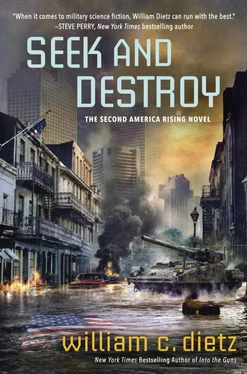
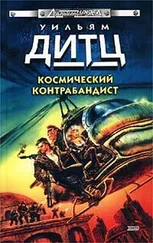
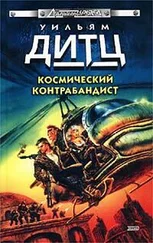
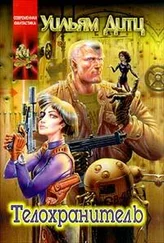
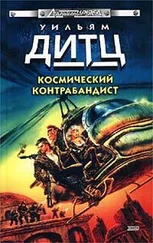
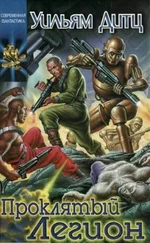
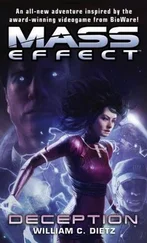

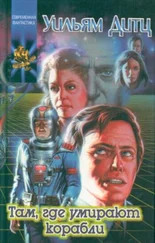
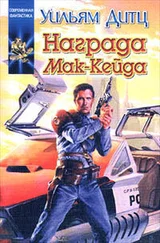
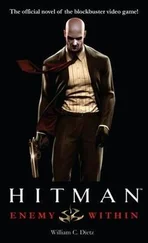
![Уильям Дитц - Избранные произведения в одном томе [Компиляция]](/books/389750/uilyam-ditc-izbrannye-proizvedeniya-v-odnom-tome-k-thumb.webp)
